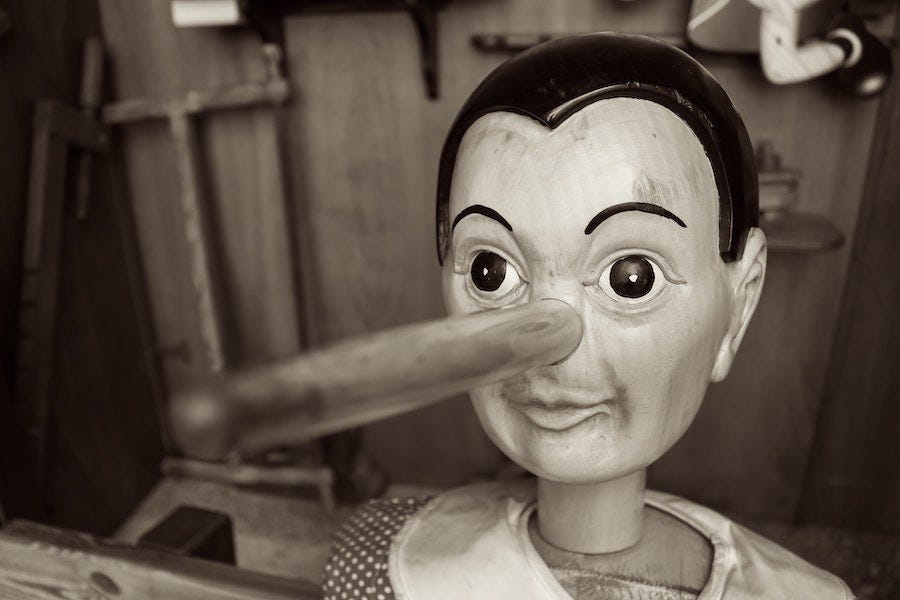Recently, I wrote about the anatomy of deceit and pandemic terrorism. This is a continuation of my long dive into the psychology and methodology of deceit.
In the past few months, I’ve been thinking a lot about what drives our choices: about wisdom, love, joy, the power of habits, the power of spiritual purity, and the role of deceit in poisoning our lives. I’ve been thinking about how deceit—if it falls on conducive ground—spoils both individual well-being and the history of the world.
Quite logically, the predator wants to make any ground conducive to preying—and tries to accomplish that task through the shock of violence and terror, through confusion, through flattery, through complacency, and by blinding the victim. And in order to protect oneself from deceit, one needs to be internally honest, humble, alert, brave, and fully alive. (But the devil is in the detail, of course.)
What drives our choices, anyway?
So how does the psychology work?
At any given moment, we have opinions and feelings about the world. Our opinions are either consistent with reality or delusional.
Regardless of whether our opinions are consistent with reality or delusional or anything in-between, we feel a strong need to imprint our opinions, our feelings, and our general energy onto the world and onto the people around us. Why? Because imprinting our message feels good. It gives us a sense of meaning. We are programmed to imprint our message. We always try to make our surroundings resonate with our emotions. Being with resonant energy “feels right,” and so we seek to establish a condition (or perception) that is resonant with ours. It reinforces us and our perceived identity and linguistic framework. I suspect that “feeling good” is how we perceive being with resonant energy.
If we are spiritually balanced (which doesn’t mean “nice” but “true to our soul”), then the message we seek to imprint on the world is actually ours. If, on the other hand, we are wobbly or scared or complacent enough to lend our imprinting capability to predators or to the fellow wobblyfolk, then we act as transmitters and amplifiers of various crap.
Again, regardless of whether our message is consistent with reality or delusional, insisting on it or imprinting it on others is pleasant (whether it’s a message of healing or a message of consumption). It’s just pleasant to imprint one’s message on others. It just feels good.
It takes great spiritual maturity to seek truth while being respectful of other people’s free will, and to seek it whether it proves us right or wrong, for the sake of understanding the world. Based on what I have observed, that kind of maturity does not just show up, it usually follows a visceral experience that makes it clear to the person that being delusional leads to unbearable pain—and that the pain that comes from being delusional tends to be much greater than any discomfort associated with facts. And this is how we learn and move past the crap and toward the love. In the existential math, every mistake is put to good use.
Relationships between people
When it comes to relationships between people, it is about the message.
A good and balanced relationship between two people is when both people like each other’s messages, and thus both people enjoy both imprinting and accepting each other’s energy.
In a similar way, a good and balanced community is a community where each person’s message is harmonious with other members of the community. This way, when people disagree, they work out the conflict, knowing that all in all, they are family.
Good relationships require that all participants do their part and pedal toward wisdom and courage.
The difference between the real reality and the “make believe” reality.
Because we are driven by feelings—and because it makes a tremendous difference whether the person is fully grounded in spiritual honesty or just seeking a “fix” to feel good in the moment—it’s possible for the not-so-benevolent people to create, sell, and enforce temporarily satisfying make-believe realities.
It works like a drug. Let’s say, if one feels somehow empty or zombie-like or dissatisfied with one’s life, one can temporarily block the discomfort and even experience euphoria based on purely sensory stimuli. But of course, as powerful or invigorated one may feel inside an artificial reality, sooner or later one has to wake up to the real reality—and the sweeter the dream, the more bitter the fall.
But unless one has experienced that fall and it really hurt in a life-threatening way, one may go for it still—and thus it’s possible to create an infinite number of “make believe" realities and feed those realities energy by recruiting witting participants and putting them to work. And here is where the history of the world comes to play. How many important events and cultural narratives took place strictly because there were enough people willing to participate in them—not because they were grounded in the real reality?
For example, if one is convinced on a sensory level that a healthy person without a mask is a danger, then demanding that other people wear the mask is a real emotional need. The distress one experiences when other people don’t comply is real distress.
The message that one wants to imprint is of totalitarian mask-up. The message is not based in reality, and may not even be the person’s own message—but the feeling is real in the physical sense—and because the person is not spiritually grounded, when other people do not allow being imprinted on, the person feels hysterical, as if he is being abused and wrong, and it’s just unfair.
Predators love it when people are spiritually ungrounded. They love eating zombies, and they thrive in the atmosphere of zombiehood—whether it’s accomplished by fear, distraction, stress, deceit, pride, glitter, or flattery, or any number of tools.
In most cases, the victims can come out of the trance but in order to do so without going through horrible pain, they need help. (Which is why I believe that a prayer for clarity is better than fear.)
Awakening
Snapping out of deceit is an important experience. The victim who acted out of character and gave energy to what’s wrong faces pain and embarrassment. From that pain of embarrassment, there is renewal and growth, and a positive change. And so the world moves forward, and the clarity learned from mistakes is usually high-quality clarity.
I believe, in the end, it is always about the restoration of joy and returning to spiritual honesty. It is always about reconnecting to one’s soul. The lesson is that living away from one’s soul is completely unbearable.
A tangent about Fourth Industrial Revolution.
The predator’s trick is temporarily blocking the victim’s view the real reality and replacing the real reality with an illusion. The illusion may be attractive or scary. It may even offer short-lived satisfaction of being important and loved. It’s like a VR set that shows the victim a movie while the predator has their hands in the victim’s pockets up to their elbow.
By the way, the entire Fourth Industrial Revolution is an industrial-level project of disconnecting everybody from the real reality and vampiring their energy. It’s about abolishing human agency—which is actually unabolishable, but it can be temporarily stolen at the price of great suffering.
Sometimes people tell me that maybe it’s not such a bad idea to live with a million sensors in the body. Well, here is an analogy. Imagine a really bad marriage. Imagine a really clueless and tactless spouse who believes that he/she knows better what’s good for you. Your spouse doesn’t need to be a thief or a murderer (even though they could be), he/she can simply be totally clueless and not “get” you at all. And that is enough to turn your life into hell!
Life under the Fourth Industrial Revolution is like a million bad marriages without a right to divorce. It’s a rape of the soul.
That said, the Fourth Industrial Revolution is merely a continuation of the tradition of lying.
Below is the story I wrote long before COVID. (Was there a time before COVID? Was there?!) That story is about living your life and then discovering that you’ve been duped.
Resilience when faced with the popularity of make-believe realities.
Recently, I asked a semi-rhetorical question:
What do you do when someone you love is being deceived and siding with the deceiver? What do you do?
My answer as of this moment is that you stand your ground and keep a cool head. In my own life, I have learned that sometimes, the only way is to not be hurt by what hurts and to always remember my goodness. After all, life is an adventure. After all, siding with love is tremendously pleasant. After all, we are here for the real reality, which is sweeter than lies.





Talk about synchronicity! I’ve been writing about lies too, using the Pinocchio trope. Strange. I think our lies in many ways are compromises we make. Living in truth is much harder than “going with the flow” of society which invariably involves a multitude of lies. You need to lie to yourself about the ecological damage your lifestyle causes, you need to lie to yourself that you really are interested in seeing your cousin Jane when you actually find her a bore. You need to lie that you think your labour is a fair exchange for the pay you receive, you need to lie about your enthusiasm for a job you really don’t like doing, you need to lie that these new pair of shoes are necessary, even cool and possibly going to make you a better person (even though you have ten perfectly serviceable pairs in the wardrobe already). All these lies are easier than the truth which may involve a quest for deeper meaning. Globocap doesn’t like deeper meanings because it cannot be monetised, hence the tsunami of lies we are fed 24/7 by the media and advertising etc. In the current set up, going along with the lies makes life easier. Calling out the lies is uncomfortable, gets you ostracised and often far worse (see Assange). But some of us can’t help ourselves. Our logic brain goes but … but … that doesn’t make sense? Like a “vaccine” that doesn’t work but is still being pushed on a populace. If only we were all a little less susceptible to choosing comfort and acceptance over truth.
"Recently, I asked a semi-rhetorical question:
What do you do when someone you love is being deceived and siding with the deceiver? What do you do?
My answer as of this moment is that you stand your ground and keep a cool head. In my own life, I have learned that sometimes, the only way is to not be hurt by what hurts and to always remember my goodness. After all, life is an adventure. After all, siding with love is tremendously pleasant. After all, we are here for the real reality, which is sweeter than lies."
I agree!